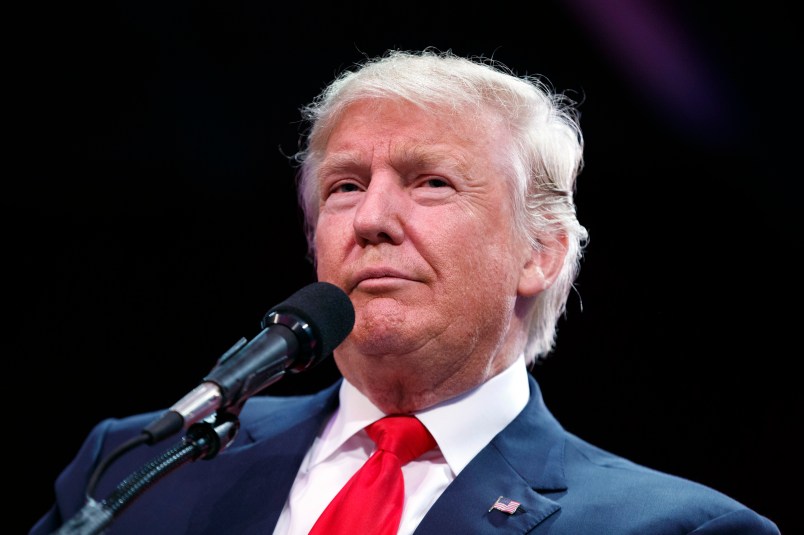GENEVA (AP) — Russia’s government lodged a formal complaint last month with the United Nations over a top U.N. official’s condemnations of Donald Trump and some European politicians, diplomats told The Associated Press, an intervention that underscores the unusual links between the Republican presidential nominee and the Kremlin.
There is no evidence Trump sought Russia’s assistance, or was even aware of the criticism by Zeid Ra’ad al-Hussein, the U.N. high commissioner for human rights.
Vitaly Churkin, Russia’s ambassador to the United Nations, issued a verbal “demarche” to U.N. Secretary-General Ban Ki-moon in a private meeting on Sept. 13, according to three diplomats familiar with the conversation. Churkin angrily protested a pair of speeches by Zeid that denounced “demagogues” and specifically targeted Trump and several populist leaders in Europe, even likening their tactics to Islamic State propaganda.
In a speech in Cleveland three months before Republicans gathered there to nominate Trump, Zeid said: “Less than 150 miles away from where I speak, a front-running candidate to be president of this country declared, just a few months ago, his enthusiastic support for torture.”
“In what may be a crucial election for leadership of this country later this year, we have seen a full-frontal attack — disguised as courageous taboo-busting — on some fundamental, hard-won tenets of decency and social cohesion that have come to be accepted by American society,” he said.
Demarches, or formal, diplomatic communications, are everyday occurrences. At the United Nations, they’re generally used to question broader foreign policy questions and sometimes used to complain. But they rarely center on specific individuals, let alone involve a Russian complaint about how the U.N. is treating an American politician.
Trump campaign spokeswoman Hope Hicks did not respond to several requests for comment.
Churkin’s personal intervention could add to questions about the relationship between Trump and Russia.
Trump has praised Putin’s strength and leadership, vowing to improve ties between Washington and Moscow if he defeats Democrat Hillary Clinton on Nov. 8. He has questioned whether NATO, an alliance of Western nations formed to counter the Soviet Union, is outdated; wrongly suggested Russia hasn’t entered Ukraine although it annexed the Crimea region in 2014 and is supporting anti-government rebels in the east; and he urged Moscow to find emails that Clinton deleted from the private server she used while secretary of state.
The diplomatic complaint could revive charges that Moscow is interfering in the presidential election, following accusations by the U.S. government that Russia sponsored cyber-intrusions like the hack of the Democratic National Committee’s emails.
A spokesman for Russia’s U.N. mission said he couldn’t discuss the matter.
“We don’t comment on meetings with ambassadors,” U.N. spokesman Farhan Haq said.
The diplomats, including two U.N. officials who were familiar with the meeting between Churkin and Ban, said that the Russian complained “virulently” to Ban about Zeid’s Cleveland speech and one in Europe in September.
A senior U.N. diplomat familiar with the discussion said Churkin specifically “condemned the fact that Zeid mentioned Trump.”
The diplomats weren’t authorized to speak publicly about the matter and spoke on condition of anonymity, fearing possible diplomatic repercussions from Russia, a powerful, permanent member of the U.N. Security Council.
The Kremlin has said it has no position on the U.S. election.
Trump’s policy pitches have alarmed human rights officials like Zeid, including his calls to build a wall along the U.S.-Mexico border, ban all Muslim immigration, kill the families of Islamic extremists and return to now-outlawed “enhanced” interrogation techniques, which are widely considered to be torture.
Trump’s positions on Russia have faced sharp attacks from some Republican leaders as well as Clinton.
His supporters pressured Republicans to back away from supporting U.S. lethal aid to Ukraine, which many GOP leaders want. Instead, the platform backed “appropriate assistance” to Ukraine.
Paul Manafort, a Trump campaign manager, resigned this summer over revelations about his work for Ukraine’s former, Moscow-backed president and other pro-Russian officials. And Carter Page, a former Trump foreign policy adviser, criticized the U.S. and other Western governments on a July trip to Moscow for “their often-hypocritical focus on ideas such as democratization, inequality, corruption and regime change.”
Eight days before Churkin’s complaint, Zeid went after Trump again in a Sept. 5 speech in The Hague, Netherlands, lumping in the billionaire businessman with several populist leaders in Europe. “All seek in varying degrees to recover a past, halcyon and so pure in form, where sunlit fields are settled by peoples united by ethnicity or religion,” Zeid said, calling it a sentiment they share with the Islamic State.
Zeid concentrated on Dutch nationalist Geert Wilders, who opposes asylum for refugees and, similar to Trump, immigration from Muslim countries. Wilders also advocates closing mosques and Islamic schools, and outlawing the Quran.
Zeid also criticized by name the pro-Brexit head of the U.K. Independence Party, Nigel Farage, who appeared with Trump at an August rally; Slovak Prime Minister Robert Fico; Austrian presidential candidate Norbert Hofer; French nationalist leader Marine Le Pen; Hungarian Prime Minister Viktor Orban; and Czech President Milos Zeman.
U.S. and European officials accuse Russia of providing financial or other assistance to several of these politicians’ parties. Russia doesn’t acknowledge such support.
Allies of Wilders, Orban, Le Pen and Farage complained vociferously after Zeid’s speech. Trump didn’t publicly respond.
While Zeid’s criticism carries no legal weight, his position gives him a highly visible pulpit to shame governments and politicians around the world. The U.S. — like Russia and other powerful governments — lobbies hard to avoid condemnation.
___
Klapper reported from Washington. Associated Press writer Jill Colvin contributed to this report.
Copyright 2016 The Associated Press. All rights reserved. This material may not be published, broadcast, rewritten or redistributed.







Don’t worry, Donald, Putin has your back.
Rather than ‘covert ops’, the Putin-Trump relationship is superliminal or smacks-you-in-the-head obvious.
Could the Russkies be as inept as Drumpf?
Maybe Chiselin’ Trump should run for president of Russia, you know, after he loses to Clinton.
This whole thing is just weird and highly suspect.